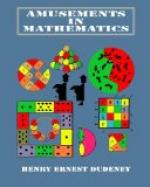ARITHMETICAL AND ALGEBRAICAL PROBLEMS.
“And
what was he?
Forsooth, a great arithmetician.”
Othello,
I. i.
The puzzles in this department are roughly thrown together in classes for the convenience of the reader. Some are very easy, others quite difficult. But they are not arranged in any order of difficulty—and this is intentional, for it is well that the solver should not be warned that a puzzle is just what it seems to be. It may, therefore, prove to be quite as simple as it looks, or it may contain some pitfall into which, through want of care or over-confidence, we may stumble.
Also, the arithmetical and algebraical puzzles are not separated in the manner adopted by some authors, who arbitrarily require certain problems to be solved by one method or the other. The reader is left to make his own choice and determine which puzzles are capable of being solved by him on purely arithmetical lines.
MONEY PUZZLES.
“Put not your trust in money, but put your money in trust.”
Oliver Wendell Holmes.
1.—A post-office perplexity.
In every business of life we are occasionally perplexed by some chance question that for the moment staggers us. I quite pitied a young lady in a branch post-office when a gentleman entered and deposited a crown on the counter with this request: “Please give me some twopenny stamps, six times as many penny stamps, and make up the rest of the money in twopence-halfpenny stamps.” For a moment she seemed bewildered, then her brain cleared, and with a smile she handed over stamps in exact fulfilment of the order. How long would it have taken you to think it out?
2.—Youthful precocity.
The precocity of some youths is surprising. One is disposed to say on occasion, “That boy of yours is a genius, and he is certain to do great things when he grows up;” but past experience has taught us that he invariably becomes quite an ordinary citizen. It is so often the case, on the contrary, that the dull boy becomes a great man. You never can tell. Nature loves to present to us these queer paradoxes. It is well known that those wonderful “lightning calculators,” who now and again surprise the world by their feats, lose all their mysterious powers directly they are taught the elementary rules of arithmetic.
A boy who was demolishing a choice banana was approached by a young friend, who, regarding him with envious eyes, asked, “How much did you pay for that banana, Fred?” The prompt answer was quite remarkable in its way: “The man what I bought it of receives just half as many sixpences for sixteen dozen dozen bananas as he gives bananas for a fiver.”
Now, how long will it take the reader to say correctly just how much Fred paid for his rare and refreshing fruit?




